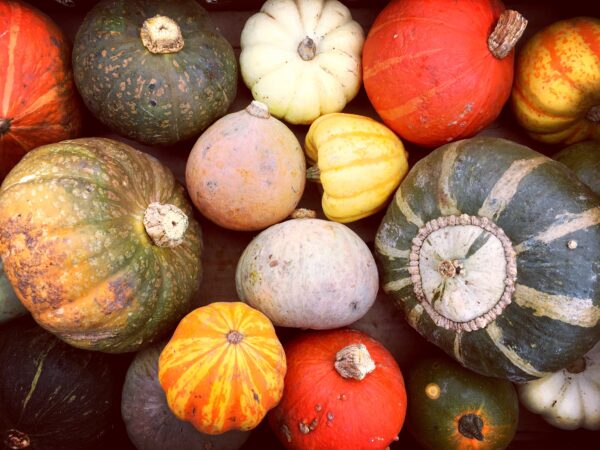
Ethics underpin our community enterprise. The farm buys only organic veg, we pay other farmers a good price for their food, and we promote seasonality of produce. We reduce packaging and food waste, and recognise the value of short supply chains and local food economies.
Our Buying Policy
Sutton Community Farm is a productive fruit and veg farm that sells VegBoxes and other fresh food through our online shop. Our farm is seven acres, and we currently sell 500+ VegBoxes per week. This means there’s a gap between what we can grow and the amount of food required to fulfil all our orders. In 2021, roughly 20% of the food in our VegBoxes came from the farm, and 80% came from elsewhere.
Our farm is certified organic, having received our certification in August 2024 from OF&G after a period of organic conversion. We have always grown fruit and veg in accordance with organic principles. The food that we buy in from elsewhere is always sourced from certified organic wholesalers and farmers. This ensures that our sources are trustworthy and adhere to strict environmental regulations.
Supporting other organic farmers through trade means they can sustain decent livelihoods. We believe in paying farmers properly for well-produced fruit and veg. One of the reasons organic food is more expensive than alternatives is because more people need to be involved. Non-organic farming relies on chemical inputs and high mechanisation, which has negative impacts on the soil, water systems, biodiversity and the wider environment.
Seasonality
Seasonality is very important to us: the majority of the contents of our VegBoxes align with the seasons in Britain. However, we acknowledge that we are in competition from supermarkets and so we need variety in what we offer. At certain times of the year we rely more heavily on imported produce from Europe – but such food is still in season where it is grown.
We never buy food that has been air-freighted: the fruit or veg we source from outside of the UK comes from farms in European countries (e.g., the Netherlands, Spain, Italy). The exceptions to this rule are that our bananas come from the Dominican Republic and ginger comes from Peru, by ship.
Reducing Food Waste
Buying food from our shop reduces food waste in the following ways:
- The order deadline for our customers is the Sunday night before the week they receive their delivery. This is because we seek to maintain a close match between what is ordered and what is harvested – this minimises the waste inherent in supermarkets’ business models
- Our customers can list up to 3 fruit and veg they dislike, so that they don’t receive unwanted items in their VegBoxes
- The VegBox model relies on trusting the farm to decide what fruit and veg customers receive each week – but we recognise this doesn’t work for everyone. In light of this, we sell a range of products that allow customers to customise an order outside of the VegBox model
- The fruit and veg we sell often has a longer shelf life than supermarket produce. This is because less time has elapsed between harvesting and delivery than is typical with supermarkets
Reducing Packaging
Buying food from our shop reduces packaging in the following ways:
- Orders are packed into reusable jute bags, which customers return to us each time they receive a new delivery
- The majority of fruit and veg is delivered loose in the jute bag, whereas supermarket organic fruit and veg is usually in plastic packaging
- Cardboard punnets are used for more delicate items, which can be returned to us and reused for portioning purposes
- Thistle bags are used for leafy veg in order to prevent damage or deterioration; such bags are not made with any plastic and are fully compostable
- For items such as salad and herbs, we use plastic bags as the thistle bags are not as effective in keeping the food fresh during transit
Short Supply Chains
Having a direct relationship with other food producers means that our supply chain is also shortened. For the majority of fresh food we sell, there is typically no more than one week between it being harvested and being delivered to our customers.
Our community business model contributes to strengthening the local food economy. We have a direct relationship with our customers, which promotes accountability and trust.